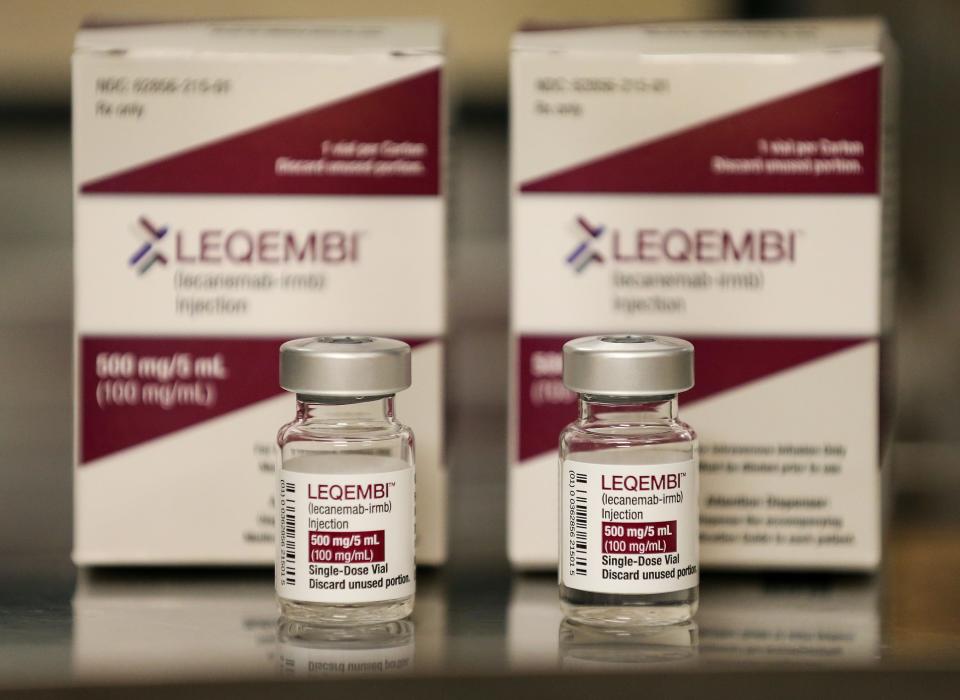What's new in Alzheimer's research? See latest facts, potential breakthroughs in 2024 report
The Alzheimer's Association released its 2024 Alzheimer's Disease Facts and Figures report last week. It's full of new information, including treatments and research, how caregivers are coping, and where the dementia care workforce is heading.
The report lifts up that we have a serious workforce gap. Texas has 333 doctors who specialize in geriatrics to care for the 459,300 people 65 or older who have been diagnosed with Alzheimer's in addition to all the other aging conditions. By 2050, we'll need 276.9% more geriatric doctors, the report found.
In just six years, we'll need 30.5% more home health and personal care aids in Texas than we currently have.
Here's what else we learned from this report as well as a panel on dementia at South by Southwest:
How many people have Alzheimer's disease?
In Texas, it's 11.9% of people age 65 or older. Nationally, it's 10.9%.
More women than men have Alzheimer's: 9% of men, 11% of women age 65 or older. One study estimates that at age 45, the lifetime risk for Alzheimer's is 20% for women and 10% for men.
The rates also vary by race: In people 65 and older, 19% of Black older adults have Alzheimer's, 14% of Hispanic older adults and 10% of white older adults.
Alzheimer's is now the sixth-leading cause of death in the United States. It has risen 140.9% from 2000 to 2021. Deaths from heart disease and stroke have actually decreased during that time.
Most people have more than Alzheimer's
Most people with dementia have more than one form. A study of autopsies of people diagnosed with Alzheimer's disease found that only 3% had Alzheimer's alone; 15% had a form of dementia that was not Alzheimer's, and 82% had more than one kind of dementia. The only definitive diagnosis is autopsy, but more screening tools are being developed.
Read more: What is this dementia Bruce Willis has? How frontotemporal lobe is different from Alzheimer's
Caregivers are exhausted but getting more help
In Texas, 26.7% of caregivers have depression, 11.2% are in poor physical health, and 59.0% have their own chronic health conditions.
The federal Centers for Medicare & Medicaid Services will roll out the Guiding an Improved Dementia Experience model in July. This GUIDE model will provide a 24/7 support hotline, as well as dementia care coordination and management, caregiver education and support, and respite services. It will incentivize providers to include both the caregiver and the person with dementia in delivering support services.
The model of "diagnose, then adios, see you next year," is going away, said Alyssa Aguirre, the assistant director of Dementia Care Transformation at the University of Texas and a social worker at the Comprehensive Memory Center, Mulva Clinic for the Neurosciences at UT Health Austin. She is also the board chair of the Alzheimer's Association Capital of Texas Chapter.
Families need education about their disease, emotional support, connection to community resources and help making complicated decisions about future care, she said. Her clinic has recently expanded its caregiver counseling program to be available to people who are not UT Health Austin patients.
How is Alzheimer's disease treated?
We currently have two disease-modifying medications that have been approved by the Food and Drug Administration: lecanemab-irmb, under the brand name Leqembi, and aducanumab-avwa, under the brand name Aduhelm. Aduhelm is being discontinued in November because Leqembi has been more effective. These drugs target the amyloid beta plaques caused by the amyloid protein.
Leqembi was shown to slow cognitive decline by 27% in clinical trials. Now, eight months after the FDA approved it, Leqembi is showing the same results in local patients receiving the infusions.
More medications like these are on the horizon. Eli Lilly is working on getting approval for donanemab, which the manufacturer says slows cognitive declines by 35%. That approval is expected to happen this year.
These medications are only for people in the early stages, though.
As of Jan. 1, 2023, 156 clinical trials were testing additional disease-modifying therapies. Some are looking at the tau protein and others are exploring inflammation, altered cell metabolism or damage from toxic oxygen molecules.
Aguirre believes there will not be a "magic pill" to cure Alzheimer's. "It's going to be a combination treatment, similar to HIV," she said.

More nonmedication therapies are being offered
In a panel on dementia at South by Southwest, panelists — who included a health futurist, doctors and researchers at aging centers — were encouraged by the number of drugs being developed. They pointed to the potential of devices, including a brain stimulation headband and headphones, virtual reality games, and data from smart watches. They also said more focus should be placed on lifestyle changes such as diet, exercise, sleep, wearing hearing aids, and engaging in cognitive and social activities.
Can Alzheimer's be prevented? The holy grail is diagnosis before symptoms
Alzheimer's begins 20 years before symptoms are seen. More dementia-related biomarkers and genes are being identified, and that can change how people get diagnosed.
One idea is looking for biomarkers on the layers of the retina. A blood test to diagnose Alzheimer's is being studied to see how accurate it is. Once that is shown to be widely effective, it could be preferable to spinal fluid testing or PET scans because it will be less invasive, quicker and less expensive.
One growing area of research is looking at people who don't have Alzheimer's yet but are at risk, to work on prevention.
The future also could be precision, personalized medicine like what is now happening in cancer.
"Preventative treatment is the moonshot," said Allison Sekuler, the president and chief scientist at the Center for Aging and Brain Health Innovation. "The goal is no new cases, no new people moving into long-term care by 2050."
This article originally appeared on Austin American-Statesman: How many people have Alzheimer's disease in Texas? See 2024 report

